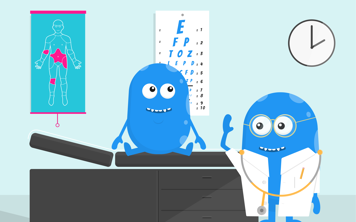Here are some ideas to help you communicate best with your health-care team.
Share your symptoms
It’s important to tell your health-care team about all your symptoms so they are better able to help you maintain your health. Hiding symptoms or feelings won't make them go away; in fact, it could even make them worse, so it’s important to be honest.
Track your pain, mood and sleep every day so that you can talk to your health-care team about these symptoms at your appointments.
Prepare questions
When you’re at your appointment, it can be easy to forget questions that you had been thinking about asking. Try to think of your questions ahead of time, write them down in a notepad or on your phone, and bring them to visits.
It’s also a good idea to write down any questions that pop into your head during your appointments. This will help you make sure that you don’t forget to ask about the things that are important to you the next time you talk with your health-care provider.
Communicate your message

Now that you’ve prepared the points you would like to cover in your appointment, it’s time to communicate them with your health-care team. Use the
communication tips from earlier in this module to help you.
Listen and take notes
Remembering the information your health-care team gives you can be tricky. Most people can remember only two or three things that health-care providers tell them unless they write them down.
For this reason, it can be helpful to write down the information in a notebook just for your health-care information. You can even ask for your health-care team’s permission to use your phone to audio-record the appointment so that you don’t miss any important points.
If you don’t understand what someone on your health-care team has told you, or you don’t feel that they answered your question, keep asking until your question has been completely answered. Repeat what your health-care team has told in your own words to check that you understand what you have heard.
Reflect on your appointment

After the appointment, review any information your health-care team gave you. If you are going online to research sickle cell disease or treatment, ask your health-care team to recommend websites and be sure to ask them questions if you are not sure about the information you find in your searches.
Sharing personal information
You may have questions about topics that are tough to talk about, such as relationships, sexual activity, mental health issues or use of recreational drugs such as alcohol.

Most young people say that they found one person on their health-care team with whom they felt more comfortable sharing thoughts and feelings about these topics. If you would like to talk to a particular person, always feel free to ask for them by name.
When it comes to difficult feelings, sometimes it is easier to talk to your health-care team than it is to talk to your parents or partner. That’s OK. Remember, they have talked about these topics with many other young people before!






